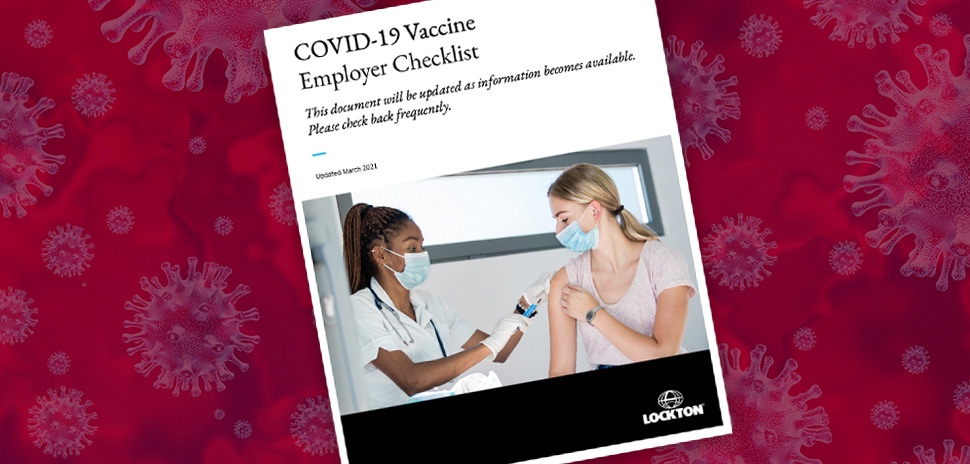As employers shift their focus to getting their teams vaccinated and, ultimately, physically back to work, they are being met with difficult decisions on vaccine mandates, how to combat hesitancy, and properly communicating policies and processes to employees effectively.
Lockton Companies—the risk management firm with global headquarters in Kansas City, London, and Dubai and two major offices in Dallas—has compiled its own guide to address these questions and offer up-to-date COVID-19 vaccination information and resources.
It’s Lockton’s Coronavirus Advisory Practice most recent project, a team that has been monitoring the pandemic closely and providing guidance and resources for its clients, who expressed a need for this checklist, according to Lockton Dunning Benefits. The Advisory has also released a “COVID-19 Vaccine Employer Pulse Survey,” which allows companies to see how their peers are handling COVID-19 vaccinations in their own firms.
According to Lockton, “As of March 22, 2021, 127 million vaccine doses had been administered in the U.S.” And, by May 1, all American adults will be eligible to be vaccinated.
At the same time, “50-70 percent of Americans, including those in at-risk segments, have expressed uncertainty toward COVID-19 vaccination at some point,” according to a McKinsey & Company survey.

[Photo: Lockton]
Both the increased eligibility across states and the persistent vaccine hesitancy in the U.S. puts employers in the position of deciding on a vaccination policy that will work for both its employees and business.
If you are in this position yourself, here is your summary of the guide Lockton curated.
The list has been divided into four major decision-making areas for employers at this stage in the vaccine rollout process: covering the cost of vaccines, developing a vaccine policy, developing a vaccine communication plan, and directing the workforce on where to get a vaccine.
Cover the cost
As an employer, you must cover any costs associated with federally approved vaccinations for your employees, according to Lockton.
Develop a vaccine policy
Depending on a company’s industry, culture, and location, it will be tasked with deciding whether to mandate the vaccine for its employees, incentivize it, or “simply communicate [its] importance,” Lockton says. This is where the bulk of the work for the employer falls, and where the checklist is focused.
The section is divided into seven sub-categories that deal with important factors to consider when developing a vaccination policy for your company, including how to ensure the company complies with the ADA (Americans with Disabilities Act), what to consider if your employees are unionized, and how to go about writing your final vaccination program.
The section also clarifies when employers are able to mandate vaccines and when they are not, stating that “the recent guidelines from the Equal Employment Opportunity Commissions (EEOC) indicate that under the Americans with Disabilities Act (ADA), and employer may mandate the vaccine when a worker poses a “direct threat” to themselves or others by their physical presence in the workplace absent the vaccine.”
So, remote employees cannot be mandated to get a vaccine.
If your company is considering a mandatory vaccination program, the checklist provides a list of “issues to consider” when doing so, including how to ask employees for proof of vaccination and how to address potential side effects from the vaccine.
For those who are hesitant to instill a mandate, Lockton suggests alternative strategies like increasing the simplicity of the vaccination process for employees and a “culturally appropriate awareness education campaign.”
Develop a vaccine communication plan
According to Lockton, while vaccine hesitancy will remain a concern over the coming months, “Current public resistance will likely start to shift during phase 1 as healthcare providers champion the importance and safety of the vaccine.”
Making employees feel comfortable with the process and maintaining regular communication will be important in this process of combating hesitancy and increasing vaccination, so Lockton has provided sample employee communications to be adapted to companies’ individual needs.
Direct workforce on where to get a vaccine
It is critical that employers are aware of the current vaccination guidelines in their state and industry so they can communicate the most helpful information to their employees, including who is eligible, where the vaccine will be administered, and where they can sign up.
It may seem early for these discussions, but, according to Lockton, “While we are still early in the vaccine rollout process, there are specific steps employers can, or must, take today and areas employers can begin considering for the near future.”
![]()
Get on the list.
Dallas Innovates, every day.
Sign up to keep your eye on what’s new and next in Dallas-Fort Worth, every day.






























